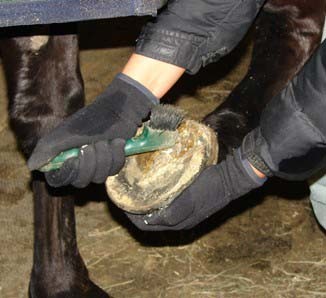Preventing or Treating Thrush in Horses

Keeping hooves clean of dirt and debris is the best way to prevent thrush. Photo by Betsy Greene, University of Vermont, CC BY-SA 2.0
By: Taylor Fabus, Michigan State University Extension
While the thought of spring time is sure to bring a quick smile to your face, this time of year brings its own challenges for horse owners. With higher-than-average snowfalls, we are sure to have a wet spring with excess moisture, and horse owners will be struggling to manage an overabundance of mud. Additionally, these wet conditions create an environment where ailments such as thrush can thrive.
Thrush is the destruction of a portion of the horse’s hoof called the frog. This destruction is caused by an anaerobic bacteria and fungi that is not contagious. Thrush brings with it a recognizable, strong-smelling odor coming from the affected area. Although thrush is a somewhat common condition, it shouldn’t be underestimated. If left untreated, it may penetrate the sensitive structures of the hoof and cause temporary to permanent lameness.
Treatment
Treatment can be relatively easy and inexpensive, especially if caught early. Kopertox and Thrush Buster can work well for treating thrush. Scott Morrison, equine podiatrist at Rood and Riddle Veterinary Clinic, identifies and talks about treating thrush in horses in the video “Identifying and Treating Thrush in Horses.”
Prevention
To prevent thrush, the best offense is a good defense. In other words, prevention and proactive farm management is crucial. The best control for thrush is proper sanitation, especially where your horses will be spending large amounts of their time. Dark and damp conditions are ideal for thrush-causing bacteria to thrive. It would be logical then, if wanting to prevent thrush, to limit these conditions. Check out this Michigan State University Extension article to help manage the mud at your horse farm.
In addition, be sure the horse’s hooves and stall are being cleaned daily with removal of wet spots and manure. If the horse is kept in a run-in shed, the area should be cleaned weekly to help minimize the buildup of organic matter, such as manure. Keeping hooves clean of dirt, debris and excess moisture is the best way to prevent thrush.
This article was published by Michigan State University Extension. For more information, visit http://www.msue.msu.edu. To have a digest of information delivered straight to your email inbox, visit http://www.msue.msu.edu/newsletters. To contact an expert in your area, visit http://expert.msue.msu.edu, or call 888-MSUE4MI (888-678-3464).










